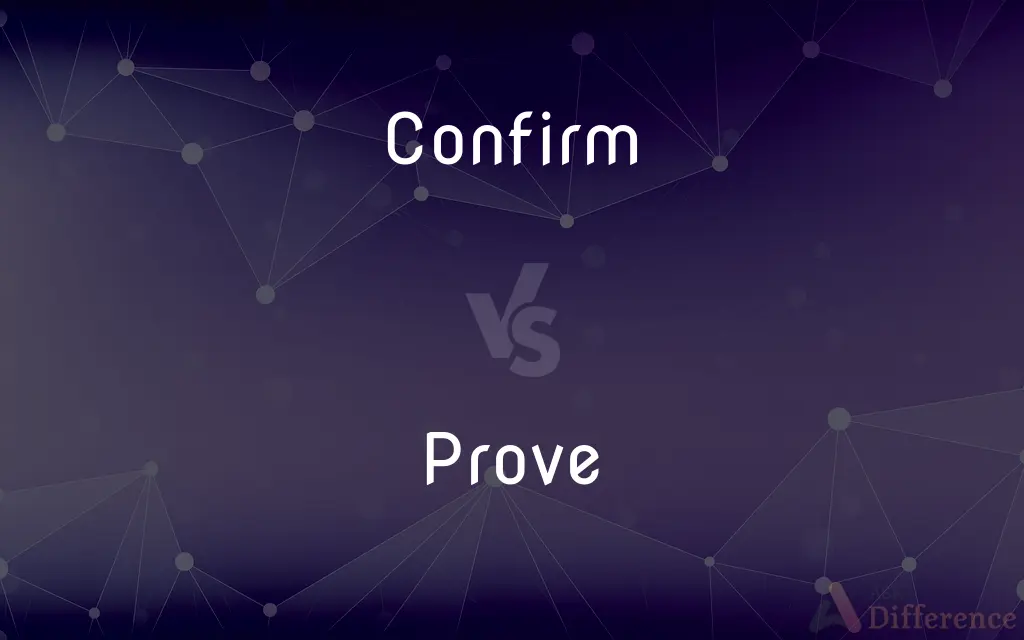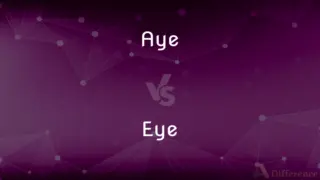Confirm vs. Prove — What's the Difference?
By Tayyaba Rehman & Urooj Arif — Updated on April 3, 2024
Confirm means to establish the truth or validity of something previously believed, while prove involves demonstrating something is true through evidence or argument.

Difference Between Confirm and Prove
Table of Contents
ADVERTISEMENT
Key Differences
Confirming something typically involves verifying or substantiating a belief, theory, or fact that is already assumed or suspected to be true. It's about adding credibility or assurance to an existing notion or observation. For example, confirming a reservation means ensuring that the booking is recognized and secured by the service provider. On the other hand, proving something goes beyond mere confirmation; it requires providing sufficient evidence or logical reasoning to establish something as true beyond reasonable doubt. Proving a hypothesis in science, for instance, involves conducting experiments that consistently support the hypothesis.
Confirmation often deals with checking the accuracy or truth of something within a known framework or set of expectations. It is about ensuring that conditions are met or that an expected outcome aligns with reality. Whereas proving something is more about discovery and establishing facts or truths that were not previously confirmed or recognized. Proving a new mathematical theorem, for example, involves creating a series of logical arguments that incontrovertibly show the theorem to be true.
The process of confirmation can sometimes be simpler, relying on existing evidence or precedents to verify the status or truth of something. For instance, confirming someone's identity might involve checking their ID card against known records. Conversely, proving something, especially in scientific or mathematical contexts, often requires a rigorous process of experimentation, observation, and logical reasoning to demonstrate a principle or theory’s validity.
In legal contexts, confirming could involve validating the details of a case or agreement, ensuring that facts or conditions are as reported or agreed upon. Proving a case in court, however, requires establishing the truth of claims or accusations through a comprehensive presentation of evidence, witness testimony, and legal argumentation, aiming to convince the jury or judge beyond a reasonable doubt.
While both confirmation and proof are integral to the acquisition of knowledge and the establishment of truth, confirmation often serves to reinforce or validate existing understandings, and proving is aimed at establishing new truths or debunking false beliefs. This distinction highlights the progression from suspicion or hypothesis to confirmed fact, underscoring the critical roles both processes play in various fields of inquiry and daily life.
ADVERTISEMENT
Comparison Chart
Definition
To establish the truth or validity of something that is already believed or expected.
To demonstrate the truth of something through evidence or logical argument.
Process
Involves verification or substantiation within a known framework or expectations.
Involves discovery, evidence gathering, and logical reasoning to establish facts.
Application Context
Used when there's an existing belief or suspicion that needs to be verified.
Used when a new fact, principle, or truth needs to be established.
Examples
Confirming a reservation, verifying someone’s identity.
Proving a mathematical theorem, establishing the truth in a legal case.
Outcome
Reinforces or validates existing understandings.
Establishes new truths or debunks false beliefs.
Compare with Definitions
Confirm
To establish firmly in one’s mind.
The trial confirmed his faith in the justice system.
Prove
To test the truth or validity of something.
The trial was an opportunity to prove his innocence.
Confirm
To verify the truth or accuracy of something.
The company confirmed the receipt of the payment.
Prove
To establish the truth by evidence or argument.
The scientist proved the new theory with experimental data.
Confirm
To acknowledge with definite assurance.
The airline confirmed my flight booking.
Prove
To demonstrate the feasibility or possibility of something.
The inventor proved that the device could work under harsh conditions.
Confirm
To reinforce or strengthen beliefs or facts.
The evidence confirmed our suspicions.
Prove
To establish a particular quality, condition, or fact.
The study proved the importance of early education.
Confirm
To make certain of something.
The meeting time was confirmed via email.
Prove
To show oneself to be worthy or capable.
She proved her skills in the national competition.
Confirm
To support or establish the certainty or validity of; verify
Confirm a rumor.
Prove
To establish the truth or validity of (something) by the presentation of argument or evidence
The novel proves that the essayist can write in more than one genre. The storm proved him to be wrong in his prediction.
Confirm
To reaffirm the establishment of (a reservation or advance arrangement).
Prove
To demonstrate the reality of (something)
He proved his strength by doing 50 pushups.
Confirm
To make firmer; strengthen
Working on the campaign confirmed her intention to go into politics.
Prove
To show (oneself) to be what is specified or to have a certain characteristic
Proved herself to be a formidable debater.
Proved herself to be worthy of the task.
Confirm
To make valid or binding by a formal or legal act; ratify.
Prove
To establish by the required amount of evidence
Proved his case in court.
Confirm
To administer the religious rite of confirmation to.
Prove
To establish the authenticity of (a will).
Confirm
To strengthen; to make firm or resolute.
Prove
To demonstrate the validity of (a hypothesis or proposition).
Confirm
To administer the sacrament of confirmation on (someone).
Prove
To verify (the result of a calculation).
Confirm
To assure the accuracy of previous statements.
Prove
To subject (a gun, for instance) to a test.
Confirm
To make firm or firmer; to add strength to; to establish; as, health is confirmed by exercise.
Confirm the crown to me and to mine heirs.
And confirmed the same unto Jacob for a law.
Prove
(Printing) To make a sample impression of (type); proof.
Confirm
To strengthen in judgment or purpose.
Confirmed, then, I resolveAdam shall share with me in bliss or woe.
Prove
(Archaic) To find out or learn (something) through experience.
Confirm
To give new assurance of the truth of; to render certain; to verify; to corroborate; as, to confirm a rumor.
Your eyes shall witness and confirm my tale.
These likelihoods confirm her flight.
Prove
To be shown to be such; turn out
A theory that proved impractical in practice.
A schedule that proved to be too demanding.
Confirm
To render valid by formal assent; to complete by a necessary sanction; to ratify; as, to confirm the appoinment of an official; the Senate confirms a treaty.
That treaty so prejudicial ought to have been remitted rather than confimed.
Prove
(transitive) To demonstrate that something is true or viable; to give proof for.
I will prove that my method is more effective than yours.
Confirm
To administer the rite of confirmation to. See Confirmation, 3.
Those which are thus confirmed are thereby supposed to be fit for admission to the sacrament.
Prove
(intransitive) To turn out; to manifest.
It proved to be a cold day.
Confirm
Establish or strengthen as with new evidence or facts;
His story confirmed my doubts
The evidence supports the defendant
Prove
(copulative) To turn out to be.
Have an exit strategy should your calculations prove incorrect.
Confirm
Strengthen or make more firm;
The witnesses confirmed the victim's account
Prove
(transitive) To put to the test, to make trial of.
They took the experimental car to the proving-grounds.
The exception proves the rule.
Confirm
Make more firm;
Confirm thy soul in self-control!
Prove
(transitive) To ascertain or establish the genuineness or validity of; to verify.
To prove a will
Confirm
As of a person to a position;
The Senate confirmed the President's candidate for Secretary of Defense
Prove
To experience.
Confirm
Administer the rite of confirmation to;
The children were confirmed in their mother's faith
Prove
To take a trial impression of; to take a proof of.
To prove a page
Prove
(homeopathy) To determine by experiment which effects a substance causes when ingested.
Prove
(baking) The process of dough proofing.
Prove
To try or to ascertain by an experiment, or by a test or standard; to test; as, to prove the strength of gunpowder or of ordnance; to prove the contents of a vessel by a standard measure.
Thou hast proved mine heart.
Prove
To evince, establish, or ascertain, as truth, reality, or fact, by argument, testimony, or other evidence.
They have inferred much from slender premises, and conjectured when they could not prove.
Prove
To ascertain or establish the genuineness or validity of; to verify; as, to prove a will.
Prove
To gain experience of the good or evil of; to know by trial; to experience; to suffer.
Where she, captived long, great woes did prove.
Prove
To test, evince, ascertain, or verify, as the correctness of any operation or result; thus, in subtraction, if the difference between two numbers, added to the lesser number, makes a sum equal to the greater, the correctness of the subtraction is proved.
Prove
To take a trial impression of; to take a proof of; as, to prove a page.
Prove
To make trial; to essay.
Prove
To be found by experience, trial, or result; to turn out to be; as, a medicine proves salutary; the report proves false.
So life a winter's morn may prove.
Prove
To succeed; to turn out as expected.
Prove
Be shown or be found to be;
She proved to be right
The medicine turned out to save her life
She turned up HIV positive
Prove
Establish the validity of something, as by an example, explanation or experiment;
The experiment demonstrated the instability of the compound
The mathematician showed the validity of the conjecture
Prove
Provide evidence for;
The blood test showed that he was the father
Her behavior testified to her incompetence
Prove
Prove formally; demonstrate by a mathematical, formal proof
Prove
Put to the test, as for its quality, or give experimental use to;
This approach has been tried with good results
Test this recipe
Prove
Increase in volume;
The dough rose slowly in the warm room
Prove
Cause to puff up with a leaven;
Unleavened bread
Prove
Take a trial impression of
Prove
Obtain probate of;
Prove a will
Common Curiosities
What does it mean to confirm something?
Confirming something means verifying its truth or accuracy, often in relation to prior expectations or beliefs.
What does it mean to prove something?
Proving something means demonstrating its truth through evidence, argument, or experimentation.
How do confirm and prove differ in scientific research?
In scientific research, confirming refers to verifying hypotheses or findings within existing theories, while proving involves establishing new principles or facts through rigorous evidence and reasoning.
Can confirmation and proof be used interchangeably?
While related, confirmation and proof have distinct meanings and are used differently based on whether an existing belief is being verified or a new truth is being established.
Is it easier to confirm or to prove something?
It generally depends on the context, but confirming may be simpler when it involves verifying within known parameters, whereas proving requires a comprehensive demonstration of truth that can be more complex.
Why is proof important in a legal context?
Proof is crucial in legal contexts to establish the truth of claims or accusations beyond a reasonable doubt, ensuring justice through objective and reliable evidence.
What role do confirmation and proof play in decision making?
They play critical roles in ensuring that decisions are based on verified information and solid evidence, leading to more informed and reliable outcomes.
Can something be confirmed without being proved?
Yes, something can be confirmed based on existing evidence or belief systems without being rigorously proved through new evidence or logical arguments.
How can biases affect the processes of confirmation and proof?
Biases can lead to selective verification or interpretation of information, affecting the objectivity and reliability of both confirmation and proof.
What is the significance of confirmation and proof in everyday life?
They are essential for making informed decisions, establishing trust, and validating information in personal, professional, and social contexts.
Share Your Discovery

Previous Comparison
Anything vs. Everything
Next Comparison
Aye vs. EyeAuthor Spotlight
Written by
Tayyaba RehmanTayyaba Rehman is a distinguished writer, currently serving as a primary contributor to askdifference.com. As a researcher in semantics and etymology, Tayyaba's passion for the complexity of languages and their distinctions has found a perfect home on the platform. Tayyaba delves into the intricacies of language, distinguishing between commonly confused words and phrases, thereby providing clarity for readers worldwide.
Co-written by
Urooj ArifUrooj is a skilled content writer at Ask Difference, known for her exceptional ability to simplify complex topics into engaging and informative content. With a passion for research and a flair for clear, concise writing, she consistently delivers articles that resonate with our diverse audience.











































